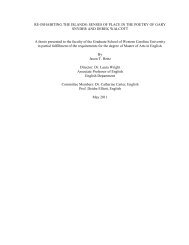SUMMERS, KAREN CRADY, Ph.D. Reading Incest - The University ...
SUMMERS, KAREN CRADY, Ph.D. Reading Incest - The University ...
SUMMERS, KAREN CRADY, Ph.D. Reading Incest - The University ...
You also want an ePaper? Increase the reach of your titles
YUMPU automatically turns print PDFs into web optimized ePapers that Google loves.
117<br />
carefully constructed identity. His sister’s body becomes the nexus of his raging<br />
uncertainty, but the actual danger comes from another direction: from below. Ferdinand<br />
is unable to control his sister—hence, all women. Women, even royal women, are<br />
conceived as inferior to men as are people like Antonio and Julia, yet they pose such a<br />
threat to the aristocracy that Ferdinand retreats into madness; furthermore, if the king is<br />
unable to control mere women, it bodes ill for his ability to control men.<br />
<strong>The</strong> three plays examined in this chapter reveal some of the specific concerns of<br />
the Elizabethan and Jacobean ages, a time which it may be said began in incest as did the<br />
Arthurian age that was so inspirational to Henry Tudor did. <strong>Incest</strong> disrupts family and<br />
societal structures, to be sure, but it begins in the early modern era to represent other<br />
tensions as well. Shakespeare’s Pericles (C. 1607), Beaumont and Fletcher’s A King<br />
and No King (1619), and Webster’s <strong>The</strong> Duchess of Malfi (C. 1613) reflect the anxieties<br />
attendant to fear of regression and insidious threats from the very people that nobility<br />
relied on to attend them and make their world possible.<br />
<strong>Incest</strong> in early modern plotlines reflects a conservative desire to maintain<br />
existing social and class structures and to defend them against erosion from emerging—<br />
and base—societal forces. <strong>The</strong> overarching conclusion to be drawn from consideration<br />
of what these threats may mean in the early modern era is that patriarchy must be<br />
supported and upheld. But only a patriarchy free from the tyranny and unsound judgment<br />
which ushers in chaos and suffering can allow the land to prosper, demonstrated by the<br />
contrasting portrayals of the good king and the bad king in Pericles. Patriarchy is also<br />
threatened by increasing female agency, which Arbaces deals with along with the threat
















